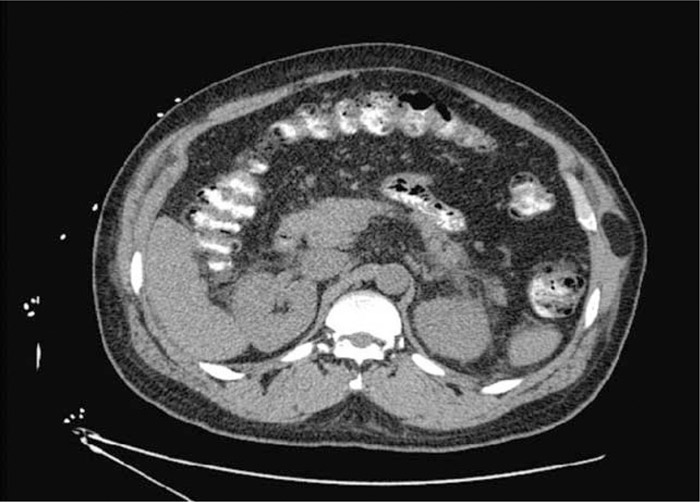Case Presentation:
A 59‐year‐old man with a history of cirrhosis, hepatitis C, diabetes mellitus, and hypertension was admitted with melena. Home medications were lisinopril and metformin. Vital signs were normal, and physical exam revealed coffee‐ground feces in the rectal vault, which was occult blood positive. Labs included hemoglobin 7.5 g/dL (4 months prior, it was 13.9 g/dL), hematocrit 24% (from 39.8%), lipase 410 U/L (reference, 73–393 U/L) and amy‐lase 126 U/L (reference, 25–125 U/L). Computed tomography (CT) scan of the abdomen/pelvis showed a nodular liver and an 11‐mm gallstone without cholecystitis. Gastrointestinal bleeding was managed appropriately, and the patient underwent a colonoscopy. The following day, the patient developed severe epigastric pain, leukocytosis, and amylase/lipase elevations > 3 times the upper limit of normal (lipase, > 3000, amylase, 516). Alkaline phosphatase was normal, and alanine and aspartate aminotransferases were slightly elevated. Repeat CT scan shows only peripancreatic soft‐tissue stranding along the inferior aspect of the pancreatic tail extending to the peritoneal surface. Our patient was treated for pancreatitis and made a full recovery.
Shows mild soft‐tissue stranding along the inferior aspect of the pancreatic tail extending laterally to the peritoneal surface. This was new and compatible with Balthazar grade C acute pancreatitis.
Discussion:
Complications of a colonoscopy include perforation and bleeding. There are 2 published cases of colonoscopy‐induced pancreatitis in the English‐language literature. It is postulated that colonic manipulation induces trauma to the pancreas because of the anatomic proximity of the pancreas and colon. Given that the pancreatic tail lies adjacent to the splenic flexure, we believe this is the etiology of pancreatitis in our patient. Although he does have cholelithiasis, there was no alkaline phosphatase elevation or biliary ductal dilation. Furthermore, inflammation was localized to the inferior aspect of the pancreatic tail, and an obstructing gallstone would cause diffuse pancreatic inflammation.
Conclusions:
Acute pancreatitis is usually induced by alcohol and gallstones. However, as this case presentation highlights, acute pancreatitis may be induced by colonoscopy secondary to trauma.
Disclosures:
V. Faridani ‐ none; K. Khosa ‐ none; D. Lala ‐ none

